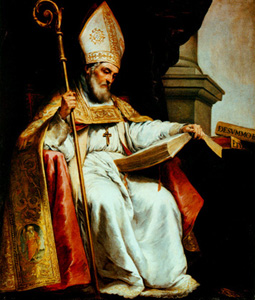Saint Isidore of Seville

Saint Isidore of Seville, teach us!
Born about the middle of the sixth century, Isidore was the brother of three saints - St Leander, his predecessor in the see of Seville, St Fulgentius and St Florentina. His noble family was related to the royal house of Visigothic monarchs whose conversion from Arianism to Catholicism occurred during his lifetime. As Isidore's Life is late and untrustworthy we cannot be sure of detailed events. Early an orphan, he was educated by his elder brother Leander, severely but with great success; for his erudition was truly remarkable, covering every branch of knowledge (including Hebrew and Greek). He was indeed a walking encyclopedia, and it was not surprising that he was chosen to succeed his brother as archbishop of Seville, an office he held for some forty years. The duties of his episcopate did not stop the output of his amazingly prolific pen. He wrote a dictionary of synonyms, a treatise of astronomy and geography, biographies of illustrious men and of biblical characters, and a history of the Goths, our only source book for much of Visigothic history. His most comprehensive and influential work was in fact an encyclopedia, his Etymologies, summarizing the knowledge of his age. In a period of encroaching barbarism, this work of preserving the surviving inheritance of antiquity was urgent and indispensable.
Though never himself a monk, Isidore composed a monastic rule. He explained, developed, and codified the Mozarabic Liturgy. He labored to eradicate the remnants of Arianism and crushed the heresy of the Acephali, a Spanish off-shoot of the Monophysite (Monothelite) heresy, which may have originated much earlier in the east as their Greek name suggests. The Monophysites taught that Christ was one divine-human nature. By example and legislation, Isidore provided schools for the education of his countrymen, their curriculum as comprehensive as his own studies. Influential at court, he took a prominent part in a council at Toledo in 610, presided over the second council of Seville in 618 or 619, and the fourth council of Toledo in 633.
Honesty, however, compels us to admit that the glory of Isidore's achievements is smirched by his encouragement of, or at least acquiescence in, anti-Semitic canons enacting severe penalties against Jews who refused to pretend to believe in the Christian faith.
Isidore died a saintly death in 636. His relics were later translated to Leon. Benedict XIV proclaimed him doctor of the church.
From The Saints, edited by John Coulson, © 1958 John Coulson.
For more on Saint Isidore:
- CATHOLIC ENCYCLOPEDIA: St. Isidore of Seville
- Catholic Online Saints: St. Isidore of Seville
- Domestic-Church.Com: Saint Profile: Saint Isodore of Seville
- St Isidore of Seville From Alban Butler's Lives of the Saints.
- Reading from St. Isidore.